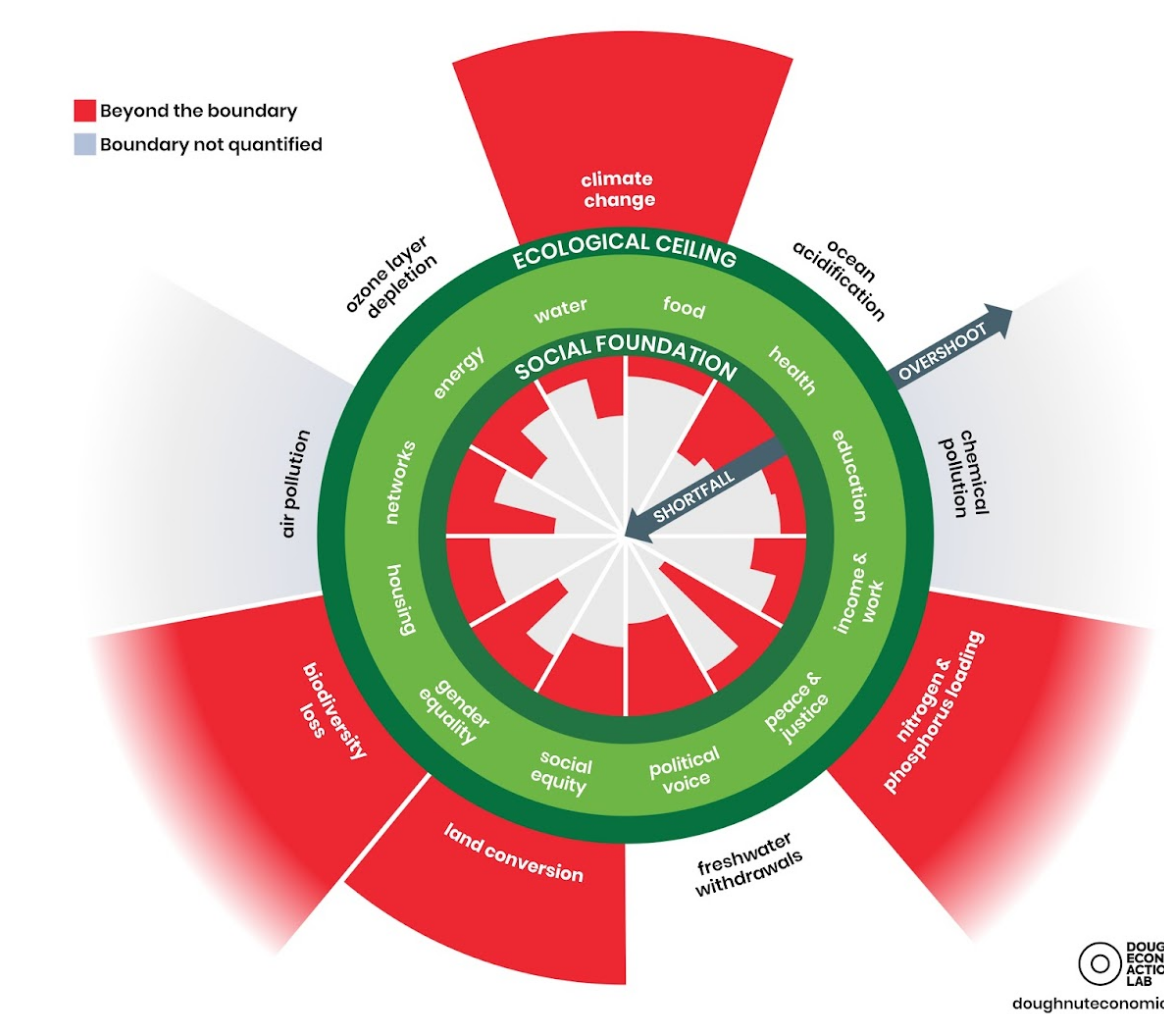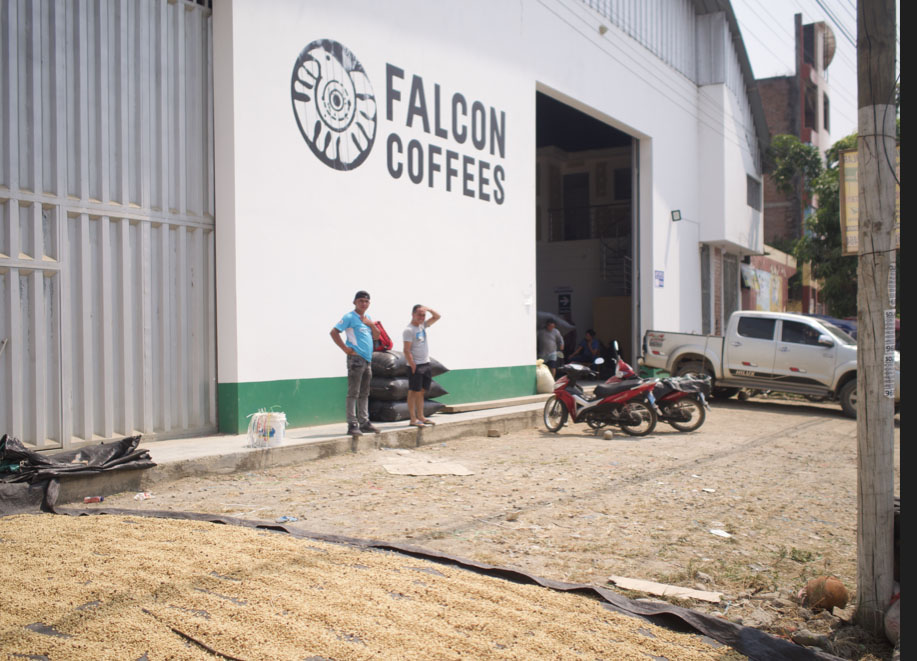Excessive consumerism, degenerative business practices and the GDP economic model: it’s the unholy trinity that has caused some serious damage to Mother Earth and a breakdown of systems impossible to ignore. The prevailing economic model, built on a linear system of extraction and overconsumption, leads to market instability, scarcity of resources, and crumbling communities. It’s time to put the brakes on degenerative businesses that prioritise short-term profits over the long-term survival of the planet.
Doughnut economics is one such way that offers a theoretical framework to correct our course and align business practices with a regenerative worldview. Developed by Kate Raworth, doughnut economics is a revolutionary system that strives to balance human needs with our planet’s limits. It envisions an economic system that ensures social well-being within the “doughnut” shape, representing a safe and just space for humanity. The inner boundary represents the minimum standards necessary for people’s well-being, such as access to food, education, and healthcare. The outer boundary represents the ecological limits of the planet, considering factors like climate change, biodiversity loss, and resource depletion. By aiming to stay within this doughnut-shaped space, the model encourages sustainable development that prioritizes both social equity and environmental sustainability.
However, businesses that want to employ this regenerative economic model must first understand what it means to be a truly regenerative business. A regenerative economic system like this will only work with businesses that are regenerative by design.

Image Source: https://doughnuteconomics.org/tools/65
What is a regenerative business?
At its core, a regenerative business enriches all stakeholders, including wider society and the environment. In a nutshell, a regenerative business:
- Nurtures healthy, happy and productive teams
- Continually develops circularity and carbon reduction within every component of its production and service delivery
- Unquestionably shows up every day to serve its Net Good
- Restores ecological and social systems
- Creates motivated and purpose-led employees
- Develops a collective mind within its industry to advance it
- Embraces collaborative thinking leadership that drives a change agenda
- Innovates new ways to engage employees
- Grows talent throughout the organisation
- Protects life supporting-systems now and in the future
- Enables communities to manifest their potential
- Holds foundational values and profits in the same stature
A model that embraces actively contributing to the well-being of the planet’s natural systems sounds like a far-fetched utopia, right? Well, evidence shows that regenerative economic approaches are sustainable for both society and the planet in the long term.
The benefits of the regenerative shift

Long-term viability
Regenerative business models focus on creating long-term value by aligning their operations with ecological and social resilience. By adopting sustainable practices and reducing waste, these businesses mitigate risks associated with resource scarcity, environmental degradation, and regulatory changes, ensuring their long-term viability.
Competitive advantage
Adopting a regenerative business model can provide a competitive edge in the marketplace. As consumers become more environmentally conscious, businesses that actively demonstrate their commitment to sustainability and regeneration often attract a growing customer base that values responsible and ethical practices.
Regulatory compliance and risk mitigation
With increasing regulations around sustainability and environmental responsibility, adopting a regenerative business model can help companies stay ahead of compliance requirements and mitigate risks associated with non-compliance.
Stakeholder engagement
A regenerative business model prioritises the engagement and collaboration of stakeholders, including employees, customers, suppliers, and local communities. By involving these stakeholders in decision-making processes, businesses can build stronger relationships, enhance reputation, and retain and attract top talent.
All roads lead back to brand strategy
While the benefits of moving from a profit-driven to a purpose-driven model are clear, it’s imperative that these principles are acted out with integrity at a brand level – as merely forcing this shift can result in greenwashing. In a regenerative economy, businesses prioritise creating value beyond financial gain and place equal importance on human and environmental ROI. To truly embody this philosophy, businesses must critically examine themselves and ask important questions such as:
- Who are we serving, and why?
- How do we want to make an impact?
- How do we want to make a difference?

Meet the companies that have nailed the regenerative model
It takes an ambitious business to shift from business-as-usual to taking action; however, there are a number of pioneers and early adopters that are making significant strides and have incorporated the regenerative model into their business DNA.
Semco Style
Semco Style UK, a software company renowned for its regenerative business model that enhances staff retention and fosters a world-class culture, is an exceptional UK case study. By prioritizing employee empowerment, trust, and autonomy through self-management principles, Semco Style UK has created a workplace that values individual contributions and promotes work-life balance.

Falcon Coffees
Coffee traders, Falcon Coffees are all about putting purpose before profit, which means creating a resilient supply chain benefiting growers over the long term. Established in 2008, Falcon Coffees was born out of the conviction that the coffee industry has the potential to drive enormous socio-economic change and harness environmental stewardship across a geo-political landscape that is home to both vulnerable communities and fragile ecosystems – and you can’t get more regenerative than that!

Naked Sprout
Naked Sprout is a manufacturer of the UK’s most sustainable tissue products and has made it its mission to use its business to help protect the planet and inspire change. Not only does its fossil fuel-free process of manufacturing mean that its products produce 50% less carbon emissions than eco alternatives, but it also ensures a living wage for everyone in its supply chain.

Fortune favours the regenerative
Transforming your business into a regenerative model requires dedication and a willingness to think outside the box. But research reveals that companies with a strong sense of purpose and employing regenerative practices are more profitable, inspire greater loyalty, and grow faster than their competitors. Though it may seem daunting, building a regenerative business is the way of the future. The potential of regenerative businesses to improve lives and protect the planet is immense.
Are you looking to integrate a regenerative approach into your brand strategy but don’t know where to begin? Let’s chat! Schedule a discovery call today.
